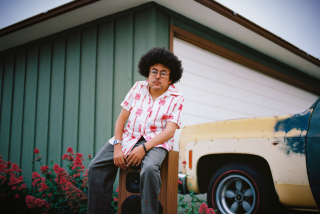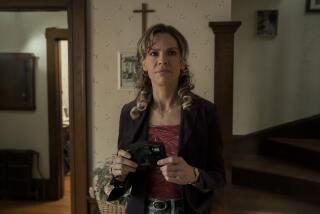Movie review: ‘Marley’ a fitting tribute to reggae star
In a world devoted to the instant and the new, Bob Marley, dead for more than 30 years, could be a dusty musical footnote. Instead, the enormous popularity of the transcendent reggae superstar shows no signs of abating, a situation”Marley,” a moving and authoritative new documentary, takes as its mission to illustrate and explain.
Only 36 when he died of cancer on May 11, 1981, Marley went from strength to strength as a recording artist and cultural figure, breaking out from early Jamaican success to enthrall a world of listeners in Europe, Asia, Africa and the Americas.
Marley achieved so much in those few years, had such a complex personal life and became so significant a figure in spiritual and political as well as musical spheres, that this film’s two-hour, 25-minute running time is barely enough to contain it all.
Working with the cooperation of the extended Marley family as well as the rights to big chunks of dazzling performance footage, director Kevin Macdonald has done exhaustive research and interviewed just about everyone of any significance in Marley’s life, including wife Rita, children Ziggy and Cedella, key collaborators such as Lee “Scratch” Perry, Bunny Wailer (in full Rastafarian regalia) and Neville Garrick as well as close friends and even girlfriends.
Given all the material there was to work with, it was essential that Macdonald (an Oscar-winner for the “One Day in September” doc who went on to do the Forest Whitaker-starring “The Last King of Scotland”) have the kind of strong dramatic sense that helped him identify the emotional moments in this story.
Marley’s exceptional songs, such as “One Love,” “No Woman, No Cry,” “Get Up, Stand Up” and “Redemption Song,” flowed from a singular combination ofJamaica’smusical traditions, Marley’s strong Rastafarian beliefs, the superb musicianship he and his collaborators brought to the table and the singer-songwriter’s unstoppable charisma.
Though Marley speaks for himself in a bit of Q&A footage, there is apparently not a lot of this kind of material, so much of the sense of the man that we get comes from interviews done specifically for this project, and it’s a tribute to the strength of the impression Marley left that people still talk about him with vividness and involvement.
“Marley” goes back to the singer’s childhood home in a rural area still mired in poverty. Born in 1945 to a black mother and a white father he rarely saw, Marley found himself shunned by both races for his mixed parentage, a situation that continued when he and his mother relocated to the capital of Kingston.
In fact, one of the film’s most moving episodes relates the way Marley’s rejection by his father’s family led directly to one of his most powerful songs, the prophetic “Cornerstone” with its lyric of “the stone the builder refused will always be the head cornerstone.”
Music was an intense interest for Marley as long as anyone can remember; an early Kingston roommate calls him “a serious focus man.” He cut his first single when he was 16 and formed the legendary Wailers with Bunny Wailer and Peter Tosh. He also fully embraced the Rastafarian movement, including the spiritual use of marijuana, finding in its harmonious “one love” doctrines the acceptance he’d been denied elsewhere.
Always eager for his music and his beliefs to be known outside Jamaica, Marley had the Wailers collaborate with Chris Blackwell of Island Records even though some of the label’s demands led to the group breaking up. “If you don’t start somewhere,” he pragmatically told a friend, “you’ll never get anywhere.”
Once he became successful, the singer moved to the swankiest neighborhood in Kingston — “I bring the ghetto uptown” was his comment — but his family did not move with him. The film does not shirk from detailing Marley’s numerous liaisons (he had 11 children from seven different relationships, including one with Cindy Breakspeare, 1976’s Miss World) and details how his wife and children coped with that situation.
Because he was such a powerful figure in Jamaica, Marley ended up involved against his will in politics, a situation that led to both an assassination attempt and a legendary concert where he called the country’s two bitter political rivals on stage and joined their hands in peace.
Though the cancer that killed Marley was found early on, a combination of bad medical advice and neglect meant that the singer’s life ended much earlier than it should have. There is an inescapable sadness to that, but what “Marley” and its wonderful performance footage leave you with most of all is the joy the man took in the music that set him free and enchanted the world.
More to Read
The biggest entertainment stories
Get our big stories about Hollywood, film, television, music, arts, culture and more right in your inbox as soon as they publish.
You may occasionally receive promotional content from the Los Angeles Times.







